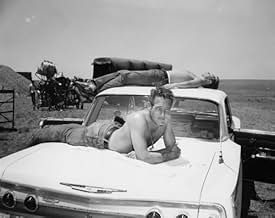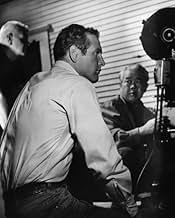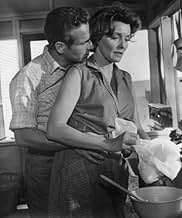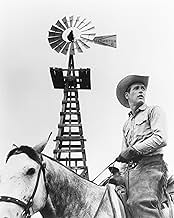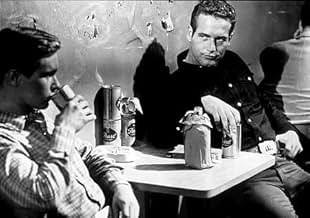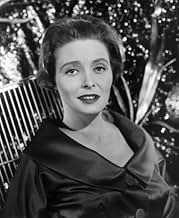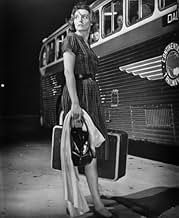AVALIAÇÃO DA IMDb
7,8/10
25 mil
SUA AVALIAÇÃO
O rebelde Hud Bannon (Paul Newman) está sempre em conflito com o pai, um respeitável e velho fazendeiro. Patricia Neal e Melvyn Douglas coestrelam em papéis premiados com o Oscar®.O rebelde Hud Bannon (Paul Newman) está sempre em conflito com o pai, um respeitável e velho fazendeiro. Patricia Neal e Melvyn Douglas coestrelam em papéis premiados com o Oscar®.O rebelde Hud Bannon (Paul Newman) está sempre em conflito com o pai, um respeitável e velho fazendeiro. Patricia Neal e Melvyn Douglas coestrelam em papéis premiados com o Oscar®.
- Direção
- Roteiristas
- Artistas
- Ganhou 3 Oscars
- 17 vitórias e 17 indicações no total
Brandon De Wilde
- Lonnie Bannon
- (as Brandon de Wilde)
Sharyn Hillyer
- Myra
- (as Sharon Hillyer)
Warren Anderson
- Proprietor Sweeping Glass
- (não creditado)
- Direção
- Roteiristas
- Elenco e equipe completos
- Produção, bilheteria e muito mais no IMDbPro
Avaliações em destaque
10krdement
As a native of West Texas, I think this film is one of the finest in American cinema. You don't watch a movie - you experience a real time and place. I happen to love a bunch of Paul Newman's films (The 3 H's - Hud, Hombre and Harper; Cool Hand Luke; The Sting; The Hustler; The Color of Money...), but I'm not what you'd call a rabid fan. I think he is compelling, but has a fairly limited range. He is perfect in this role, but it isn't much different from The Hustler or Cool Hand Luke. However, watching Melvyn Douglas is like watching somebody that Marty Ritt pulled off of some ranch and filmed in his daily life. His performance is absolutely dead- on. The gravelly drawl, the old boy shuffle, his expression - the way his eyes take in the landscape or gaze intently into a bowl of ice cream while Hud talks - all incredibly REAL! I KNOW those old guys!
Melvyn Douglas is a truly under-appreciated American acting genius whose career spanned over 5 decades. His range is tremendous. This is the same honey-tongued actor who is the perfect comic foil to Garbo's Ninotchka in the '30's (In fact, he is one of her only REPEAT leading men!) And his bluster-filled performance in I Never Sang for My Father (with another modern great, Gene Hackman) is also out of this world! Other commentators have addressed Hud's multi-faceted story and the incredible B&W cinematography. All wonderful - but the next time you watch this true American classic, focus on Douglas' Oscar-winning performance. You will be amazed! (And remind yourself of some of the early roles in romantic comedies - Ninotchka, That Uncertain Feeling, This Thing Called Love or Mr. Blandings Builds His Dream House - this same actor performed so well.)
Melvyn Douglas is a truly under-appreciated American acting genius whose career spanned over 5 decades. His range is tremendous. This is the same honey-tongued actor who is the perfect comic foil to Garbo's Ninotchka in the '30's (In fact, he is one of her only REPEAT leading men!) And his bluster-filled performance in I Never Sang for My Father (with another modern great, Gene Hackman) is also out of this world! Other commentators have addressed Hud's multi-faceted story and the incredible B&W cinematography. All wonderful - but the next time you watch this true American classic, focus on Douglas' Oscar-winning performance. You will be amazed! (And remind yourself of some of the early roles in romantic comedies - Ninotchka, That Uncertain Feeling, This Thing Called Love or Mr. Blandings Builds His Dream House - this same actor performed so well.)
It's difficult to grasp that Melvyn Douglas spent most of his career sailing through light, romantic roles and emerged in old age as one of the greatest actors in cinema history. Knowing the talent he possessed, how did he keep from killing the heads of the studios? Paul Newman, Melvyn Douglas, Patricia Neal, and Brandon de Wilde star in "Hud," an unsparing 1963 morality story about a Texas rancher, Homer Bannon, his bastard son, Hud, his housekeeper, and his grandson. The bastard, of course, is Paul Newman, who doesn't have a decent bone in his body. People on this board have said it's his greatest performance. He's given so many great ones, it's hard to say for me. An astounding actor, and he gets a run for his money from Douglas, who plays the moral center of the story.
The two characters couldn't be more opposite, as one sees in their treatment of a potential run of hoof and mouth disease that could wipe out Homer's entire herd. Hud wants to ship the whole herd out and possibly infect other people's cattle - he couldn't care less. Homer won't hear of it.
If you love animals, this is a difficult film to watch, but it's worth it. Melvyn Douglas is absolutely gut-wrenching as Homer, a proud man who loves the land and his cattle and who has no use for his son, who smashed his car and killed Homer's other son. de Wilde is Hud's nephew who admires him and wants to emulate him but as time goes by, realizes that Hud is made of ice. de Wilde doesn't give an emotional performance - he's almost more of an observer. It works well here amidst the very contained Douglas and the free and easy Newman. You can see he's a good kid trying to grow up and decide what kind of man to be.
Patricia Neal is the housekeeper; she and Douglas both deservingly won Oscars. Her delivery is wry and knowing; she can't help being attracted to the virile Hud but she knows he's trouble and never gives in to her desires willingly.
As much as I love Newman and think he's one of the greatest actors ever to hit the movies, for me, Douglas' searing performance is the one that will stay with me. It's easy to see why in 1963 this was such a dramatic breakthrough for Newman, but 43 years and many roles later, we're more familiar with what he can do. We know he can play a cold bastard now. His greatest performances for me will always be those in the "The Verdict" and "The Hustler," both of which called for many more nuances of character. Hud represents '60s disillusionment - which as the decade went on was only going to get worse; this is one of the reasons it is an iconic role. For me, Newman had more surprises in store.
Brilliant performances, excellent direction, stark photography, Hud is a great American film, not easily forgotten once seen.
The two characters couldn't be more opposite, as one sees in their treatment of a potential run of hoof and mouth disease that could wipe out Homer's entire herd. Hud wants to ship the whole herd out and possibly infect other people's cattle - he couldn't care less. Homer won't hear of it.
If you love animals, this is a difficult film to watch, but it's worth it. Melvyn Douglas is absolutely gut-wrenching as Homer, a proud man who loves the land and his cattle and who has no use for his son, who smashed his car and killed Homer's other son. de Wilde is Hud's nephew who admires him and wants to emulate him but as time goes by, realizes that Hud is made of ice. de Wilde doesn't give an emotional performance - he's almost more of an observer. It works well here amidst the very contained Douglas and the free and easy Newman. You can see he's a good kid trying to grow up and decide what kind of man to be.
Patricia Neal is the housekeeper; she and Douglas both deservingly won Oscars. Her delivery is wry and knowing; she can't help being attracted to the virile Hud but she knows he's trouble and never gives in to her desires willingly.
As much as I love Newman and think he's one of the greatest actors ever to hit the movies, for me, Douglas' searing performance is the one that will stay with me. It's easy to see why in 1963 this was such a dramatic breakthrough for Newman, but 43 years and many roles later, we're more familiar with what he can do. We know he can play a cold bastard now. His greatest performances for me will always be those in the "The Verdict" and "The Hustler," both of which called for many more nuances of character. Hud represents '60s disillusionment - which as the decade went on was only going to get worse; this is one of the reasons it is an iconic role. For me, Newman had more surprises in store.
Brilliant performances, excellent direction, stark photography, Hud is a great American film, not easily forgotten once seen.
Not only a stark morality tale brimming with grit and substance, "Hud" is a vigorous character study replete with intelligent, Oscar-winning performances.
The vast, desolate "Lone Star" landscape has often inspired potent Hollywood screen-writing (witness "Giant," and "The Last Picture Show"). 1963's "Hud" is no exception. The story focuses around a bored, aimless, arrogant ne'er-do-well whose utter contempt for humanity threatens to denigrate and destroy all those exposed to it. Thrust in a dusty, dried-up, decaying Texas cattle town (awesomely photographed in black-and-white by Oscar-winning cinematographer James Wong Howe), the story bears down assertively on its straightforward themes of nihilistic youth and misguided hero worship.
Paul Newman was awarded an Oscar - but not for "Hud." He took home the award much later for his performance in 1987's "The Color of Money" but for me it was a restitutive pat on the back for his probing, higher-calibre work here in "Hud," among others. Newman gives an assured, excitingly reckless performance, the creme of the crop of earlier, jaunty perfs. All swagger and bluff, reeking with cocky sexuality, Hud Bannon is the personification of cool, callous cynicism at its most reprehensible...and alluring. The world is this cowboy stud's oyster. He takes what he wants, whenever he wants it - whether its coveting his father's land or coveting another man's wife, whether its peddling sick cattle on others or peddling his ethics on a susceptive boy - it's all at the core of a dangerously irresponsible life's dogma. A loser's warped vision of winning. It was a risky star performance for Newman as Hud has no redeeming qualities whatsoever, but the actor plays out his acting cards brilliantly and winds up with a royal flush.
Newman is bolstered by a choice cast. Dusky-voiced Patricia Neal, whose looks had begun to harden by this time, is fascinating as the forlorn, slovenly housekeeper Alma who has her careworn hands full just keeping the lustful, roving Hud in line. Hud (and the audience) is perked by her stifled but not yet snuffed out sensuality, as she wisely avoids the obvious come-ons tossed her way. Making relative peace with her lonely, desultory existence, Alma has overcome a difficult past and find a sense of being as the makeshift homemaker to an aging rancher/widower (Melvyn Douglas) while tending to his impressionable grandson (Brandon de Wilde), instilling in the boy some good old-fashioned sense and motherly attention when necessary. Neal is top-notch especially in her final scenes and quite deserved her Oscar.
Oscar-winning Douglas is superb as Hud's upstanding, uncompromising father, a cattle man in the twilight of his years. Chocked full of conventional wisdom and righteous indignation, the prideful old-timer may or may not have contributed to his son's acute moral letdown, having given up on him as a "bad seed" long ago. Their confrontational scenes are pocked with harsh accusations and bitter conflict - never to be resolved. De Wilde, in a coming-of-age extension of his memorable "Shane" role, again portrays the embodiment of idolizing youth as the teenage Lon. Drawn to the brawling, good-looking "outer package" of his older Uncle Hud, deWilde is touching as his character gradually wises up to the realization that this superficial "package" is damaged goods, while those nearest and dearest to him fall by the waste side.
A near-classic to be sure. The performances alone make this a not-to-be-missed item.
The vast, desolate "Lone Star" landscape has often inspired potent Hollywood screen-writing (witness "Giant," and "The Last Picture Show"). 1963's "Hud" is no exception. The story focuses around a bored, aimless, arrogant ne'er-do-well whose utter contempt for humanity threatens to denigrate and destroy all those exposed to it. Thrust in a dusty, dried-up, decaying Texas cattle town (awesomely photographed in black-and-white by Oscar-winning cinematographer James Wong Howe), the story bears down assertively on its straightforward themes of nihilistic youth and misguided hero worship.
Paul Newman was awarded an Oscar - but not for "Hud." He took home the award much later for his performance in 1987's "The Color of Money" but for me it was a restitutive pat on the back for his probing, higher-calibre work here in "Hud," among others. Newman gives an assured, excitingly reckless performance, the creme of the crop of earlier, jaunty perfs. All swagger and bluff, reeking with cocky sexuality, Hud Bannon is the personification of cool, callous cynicism at its most reprehensible...and alluring. The world is this cowboy stud's oyster. He takes what he wants, whenever he wants it - whether its coveting his father's land or coveting another man's wife, whether its peddling sick cattle on others or peddling his ethics on a susceptive boy - it's all at the core of a dangerously irresponsible life's dogma. A loser's warped vision of winning. It was a risky star performance for Newman as Hud has no redeeming qualities whatsoever, but the actor plays out his acting cards brilliantly and winds up with a royal flush.
Newman is bolstered by a choice cast. Dusky-voiced Patricia Neal, whose looks had begun to harden by this time, is fascinating as the forlorn, slovenly housekeeper Alma who has her careworn hands full just keeping the lustful, roving Hud in line. Hud (and the audience) is perked by her stifled but not yet snuffed out sensuality, as she wisely avoids the obvious come-ons tossed her way. Making relative peace with her lonely, desultory existence, Alma has overcome a difficult past and find a sense of being as the makeshift homemaker to an aging rancher/widower (Melvyn Douglas) while tending to his impressionable grandson (Brandon de Wilde), instilling in the boy some good old-fashioned sense and motherly attention when necessary. Neal is top-notch especially in her final scenes and quite deserved her Oscar.
Oscar-winning Douglas is superb as Hud's upstanding, uncompromising father, a cattle man in the twilight of his years. Chocked full of conventional wisdom and righteous indignation, the prideful old-timer may or may not have contributed to his son's acute moral letdown, having given up on him as a "bad seed" long ago. Their confrontational scenes are pocked with harsh accusations and bitter conflict - never to be resolved. De Wilde, in a coming-of-age extension of his memorable "Shane" role, again portrays the embodiment of idolizing youth as the teenage Lon. Drawn to the brawling, good-looking "outer package" of his older Uncle Hud, deWilde is touching as his character gradually wises up to the realization that this superficial "package" is damaged goods, while those nearest and dearest to him fall by the waste side.
A near-classic to be sure. The performances alone make this a not-to-be-missed item.
10T-Gore
Paul Newman gave easily his greatest performance as Hud Bannen, the hard-fighting, hard-drinking, womanising ne'er-do-well, who casts a malign shadow over the lives of his family and their housekeeper on a Texas ranch. It is a strong all-round cast however, and Melvyn Douglas and Patricia Neal both won Academy Awards for their performances. The sparse and grainy cinematography by James Wong Howe (another Oscar winner) brilliantly captures the harsh, arid Texas landscape. Adapted from Larry McMurtry's novel Horseman Pass By, this is one of the finest examples of American Cinema in the 1960's, not least in its depiction of father-son conflict, and the way one in which one man can profoundly influence, for the worse, the lives of those around him. Newman worked as a ranch-hand in Texas to prepare for the role, which helped him obtain his authentic Texan credentials, most notably his accent, and his cocky strut and manner. A timeless classic, which can be viewed again and again.
HUD is a drama film with elements of a western about an arrogant and irresponsible son of a rancher, whose life is very messy. This is a story about relationships and conflicts within a family. It is based on Larry McMurtry's 1961 novel, "Horseman, Pass By".
Hud is an amoral and unemotional rancher. He, very often, comes into a conflict with his father, which has a negative impact on his young nephew. His father holds Hud responsible for the death of his other son. He tries to imbue his grandson with a sense of decency and responsibility to others. When their cattle fall ill, the conflict between father and son begins to escalate...
The Texas cow country is represented through a discord in a family. It's nothing new, but a realistic approach is enriched with dose of a sick materialism and immorality, which is probably the biggest asset of this film. This is a cold review of one human mind, which rejects any kind of traditional values. Characters is placed on the scale several times, but it is clear that there is no winner. One thing is certain, this is not a conflict between traditional and modern ways of thinking.
The scenery is a kind of combination between a poor ranch and cheap city. The atmosphere is grim and tense. Characterization is very good.
Paul Newman as Hud Bannon is a restless, arrogant and ambitious rancher. He is a man, who has fallen into a trap of modern understanding of life around him. He, at the same time, understands and despises the people around him. Mr. Newman is a charming monster in this film.
Melvyn Douglas as Homer Bannon is a traditional farmer who loves his ranch and cattle more than his own son. He is an old man who sees his own disappointment and shame in actions and behavior of his son. Mr. Douglas has offered a very touching performance.
Brandon deWilde as Lonnie Bannon is a young man who is torn with relationship between his venerable grandfather and his harsh and greedy uncle. He is naive, sensitive and, perhaps, sexually depressed. Patricia Neal as Alma Brown is a lonely housewife with a broken heart and a strong dignity. Ms. Neal has almost stole this show.
Hud is an amoral and unemotional rancher. He, very often, comes into a conflict with his father, which has a negative impact on his young nephew. His father holds Hud responsible for the death of his other son. He tries to imbue his grandson with a sense of decency and responsibility to others. When their cattle fall ill, the conflict between father and son begins to escalate...
The Texas cow country is represented through a discord in a family. It's nothing new, but a realistic approach is enriched with dose of a sick materialism and immorality, which is probably the biggest asset of this film. This is a cold review of one human mind, which rejects any kind of traditional values. Characters is placed on the scale several times, but it is clear that there is no winner. One thing is certain, this is not a conflict between traditional and modern ways of thinking.
The scenery is a kind of combination between a poor ranch and cheap city. The atmosphere is grim and tense. Characterization is very good.
Paul Newman as Hud Bannon is a restless, arrogant and ambitious rancher. He is a man, who has fallen into a trap of modern understanding of life around him. He, at the same time, understands and despises the people around him. Mr. Newman is a charming monster in this film.
Melvyn Douglas as Homer Bannon is a traditional farmer who loves his ranch and cattle more than his own son. He is an old man who sees his own disappointment and shame in actions and behavior of his son. Mr. Douglas has offered a very touching performance.
Brandon deWilde as Lonnie Bannon is a young man who is torn with relationship between his venerable grandfather and his harsh and greedy uncle. He is naive, sensitive and, perhaps, sexually depressed. Patricia Neal as Alma Brown is a lonely housewife with a broken heart and a strong dignity. Ms. Neal has almost stole this show.
Você sabia?
- CuriosidadesPatricia Neal was particularly proud of one unscripted moment that made it into the film. While talking to Hud about her failed marriage, a huge horsefly flew onto the set. Just as she says she's "done with that cold-blooded bastard," she zaps the fly with a dish towel. Martin Ritt loved it and printed the take.
- Erros de gravaçãoIn the first scene, you can see the cameramen and tripod of the cameras in the window of the store.
- Citações
Homer Bannon: Lonnie, little by little the look of the country changes because of the men we admire. You're just going to have to make up your own mind one day about what's right and what's wrong.
- ConexõesFeatured in The 40th Annual Academy Awards (1968)
- Trilhas sonorasThe Great Titanic (It Was Sad When That Great Ship Went Down)
(uncredited) (ca 1915)
American folk song
Sung a cappella by Paul Newman and Brandon De Wilde
Principais escolhas
Faça login para avaliar e ver a lista de recomendações personalizadas
- How long is Hud?Fornecido pela Alexa
Detalhes
Bilheteria
- Orçamento
- US$ 2.500.000 (estimativa)
- Tempo de duração1 hora 52 minutos
- Cor
- Proporção
- 2.39 : 1
Contribua para esta página
Sugerir uma alteração ou adicionar conteúdo ausente



